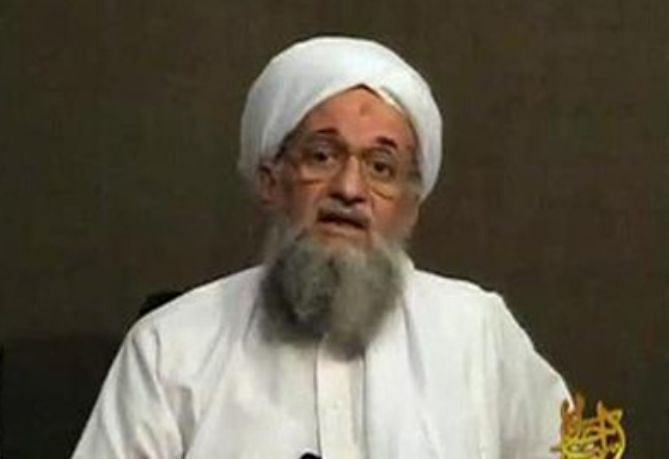Militant threats nearer home…
Militant threats nearer home…

The world is never short of threats and intimidation. The latest to be blurted out is from al-Qaida leader Ayman al Zawahri. He claims to have flagged off an Indian branch of his militant group 'spearheading' a South Asian front.
Set against Lashkar-e-Tayyeba's Taj Hotel massacre in Bombay, such a threat from al-Qaida with its presence in Pakistan and Afghanistan at once beeps under the radar.
A Reuter report on Thursday quoted al Zawahri as boasting that Muslims in Bangladesh, Myanmar as well as Assam, Gujarat, Ahmedabad, Jammu and Kashmir in India would be 'happy' over the news.
Although South Asia is no stranger to extremist ambitions, real or potential; yet there is a greater risk perception in the present security context of the region.
The questions that beg answer are: Why India, Bangladesh and Myanmar are being targeted afresh? As for India, the election of rightist BJP to power may have produced non-secular sentiments, especially linked to Sangh Parivar as a perceived nurturing ground for induced counter extremism.
Pakistan has grown politically simmering with Tehrik-e-Insaf leader Imran Khan and cleric al-Quadri launching a movement and placing the country on an undemocratic trajectory. Nawaz Sharif government mandated to power eleven months ago is taking the brunt of pressure from army chief Raheel Sharif who is thought to be claiming a prerogative on Kashmir policy.
Strangely enough, a Bangladeshi ghost is apparently riding on Imarn's shoulder. He has waged a movement around what he called a six-point charter and has readied a script of a 'softer' version of Bangladeshi caretaker model of 2007-08. What an irony of fate in a fragile democracy that has never got a chance to consolidate its roots in Pakistan!
At any rate, Pakistani radicalism has been thriving on a handholding between Afghan and Pakistani Talibans as it sea-saws between dialogue with Pakistan and Afghan governments and non-cooperation with them.
Bangladesh for its part has outlawed 12 extremist parties. Caches of arms are often recovered. But circulation of small arms remains an issue. The government is stern in dealing with bigoted militant elements. Yet, stories of their attempted regrouping are unearthed by Rab from time to time. The latest threat from Al Zawahri may be seen in light of a sprinkling of Afghan and Iraq war trainees among Bangladeshis, suspected to be ducking somewhere. Then we must keep mounting our guard on prospects of terror or radical financing.
Myanmar comes in the loop due to persecution of Rohingya Muslims in Rakhaine state of that neighbouring country. The refugees' radicalization overseas is reported in fits and starts.
The beheading of US journalists James Foley and Steven Sotloff by ISIS and the threatened execution of a British journalist have had US President Obama and British Premier David Cameroon react with shock and consternation. ISIS links this brutal response to US war in Iraq and its indecisive dealing with Assad regime in Syria.
Obama realises that a unilateral cowboy-style Bush attack holds no answer. Seasoned American experts are advocating taking Iran and Saudi Arabia on board along with Shia and moderate Sunni elements thrown into the coalition. Cameroon, though determined to 'squeeze out' the ISIS of existence, is not in favour of placing British boots on the soil.
The ISIS has even threatened Putin pictured on a Russian plane for his arming Syria.
It seems the Western dilemma is between repeating Afghan or Iraq mistakes and waffling through still fragile diplomatic approaches under UN auspices.
An example of diplomatic software policy is illustrated by US University in Niger taking in brave escapee girls from Boko Haram's strangling grip and sponsoring their education through scholarships. Would Boko Haram given to its own variety of unbridled violence be chastised to the ways of civilised world?
Growing in a funeral parlour home of her father's, a British woman had two indelible impressions etched on her mind that would guide her through life. First, she saw the dignity of the dead embalmed and groomed by her father before being put to the grave. Even corpses of criminals were treated with respect. The second gift she took emerging from the upstairs of the funeral home was her love for life. She embraced an intensely rewarding career in London.
When life is an un-winded toy left to tumble, who is ashamed of dehumanising death? The gore of death needs to be eliminated with a balanced sensitivity to the axiomatic truth that only the Non-Being who gives life is entitled to taking it.
The writer is Associate Editor, The Daily Star.
E-mail: husain.imam@thedailystar.net